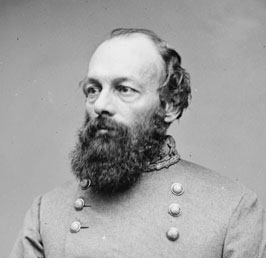 |
| General Edmund Kirby Smith |
GENERAL ORDERS,
HDQRS. TRANS-MISSISSIPPI DEPARTMENT, No. 56.
Shreveport, La., November 16, 1863.
All quartermaster's stores, clothing, camp and garrison equipage, or material for manufacturing the same, received at any point upon the Rio Grande, or through the Gulf ports of this department, will, until further orders, be distributed as follows:
For the troops of the District of Arkansas, Indian Territory, and Northern Sub-District of Texas, four-tenths. Depots at Bonham and Jefferson, Tex.
For the troops of the District of Texas, New Mexico, and Arizona, except the Northern Sub-District of Texas, two-tenths. Depots at San Antonio and Houston.
For the troops of the District of Western Louisiana, three-tenths. Depot of Shreveport, La.
For the department at large, one-tenth. Depot in charge of Major W. H. Haynes, quartermaster and chief of clothing bureau, at department headquarters.
All officers receiving quartermaster's stores, clothing, camp and garrison equipage, or material thereof, at any of the points designated, are directed to report at once to these headquarters the amount of each article received, and will forward the stores without delay to the depots herein mentioned. The officers in charge at the issuing depots will report each arrival of stores, in anticipation of requisitions, prepare them for issue to the troops.
By command of Lieutenant General E. Kirby Smith:
S. S. ANDERSON,
Assistant Adjutant-General.
Official Records, Series I., Vol. 22, Part 2, Page 1071.
When Kirby Smith succeeded Theopolis Holmes in chage of the Trans-Mississippi Department of the Confederacy it became to be knpwn as the Kirby-Smithdom. It included all the territory between Fort Smith, Arkansas and the Rio Grande River. Because Union forces stood between this area and the supply and communications network of the Confederate government, Smith functioned as almost a head of state. He often operated without communication to Richmond and even more often without supplies from outside the department. His kingdom, or Smithdom as it were, was as independant a command as circumstances would allow on either side of the Civil War.
No comments:
Post a Comment